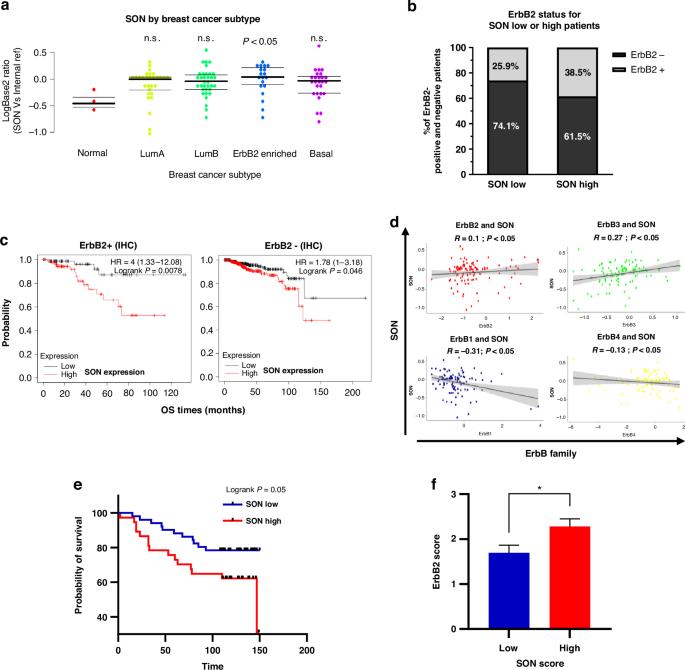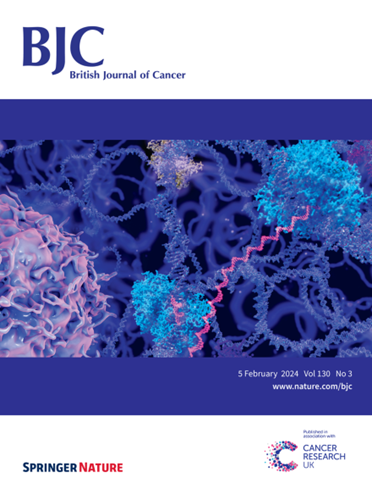SON 是促进乳腺癌中 ErbB2 和 ErbB3 表达的重要 RNA 剪接因子。
IF 6.4
1区 医学
Q1 ONCOLOGY
引用次数: 0
摘要
背景:在乳腺癌中,ErbB 受体起着至关重要的作用,克服耐药性仍是临床上的一大挑战。然而,人们对 ErbB 家族基因错综复杂的调控机制知之甚少。在这里,我们证明了SON是一种ErbB调控剪接因子,也是ErbB阳性乳腺癌的新型治疗靶点:方法:利用公共数据库、患者组织芯片和细胞系对 SON 和 ErbB 的表达进行分析。方法:利用公共数据库对 SON 和 ErbB 的表达进行分析,并对患者组织微阵列和细胞系进行分析,评估 SON 敲除对细胞增殖、凋亡、激酶磷酸化、RNA 剪接和体内肿瘤生长的影响。进行RNA免疫沉淀以测量SON的结合情况:结果:SON在ErbB2阳性乳腺癌患者样本中高表达,与患者生存率成反比。SON 基因敲除会诱导 ErbB2 和 ErbB3 转录本中选择性剪接位点的内含子保留,从而影响有效的 RNA 剪接并降低蛋白质表达。SON干扰抑制了ErbB2/3的下游激酶信号,包括Akt、p38和JNK通路,与ErbB2阴性细胞相比,ErbB2阳性乳腺癌细胞更容易受到影响。在ErbB2阳性乳腺癌异种移植物中沉默SON可导致体内肿瘤消退:结论:我们发现 SON 是一种新型 RNA 剪接因子,在调控 ErbB2/3 表达中发挥着关键作用,这表明 SON 是 ErbB2 阳性乳腺癌的理想治疗靶点。本文章由计算机程序翻译,如有差异,请以英文原文为准。

SON is an essential RNA splicing factor promoting ErbB2 and ErbB3 expression in breast cancer
In breast cancer, ErbB receptors play a critical role, and overcoming drug resistance remains a major challenge in the clinic. However, intricate regulatory mechanisms of ErbB family genes are poorly understood. Here, we demonstrate SON as an ErbB-regulatory splicing factor and a novel therapeutic target for ErbB-positive breast cancer. SON and ErbB expression analyses using public database, patient tissue microarray, and cell lines were performed. SON knockdown assessed its impact on cell proliferation, apoptosis, kinase phosphorylation, RNA splicing, and in vivo tumour growth. RNA immunoprecipitation was performed to measure SON binding. SON is highly expressed in ErbB2-positive breast cancer patient samples, inversely correlating with patient survival. SON knockdown induced intron retention in selective splice sites within ErbB2 and ErbB3 transcripts, impairing effective RNA splicing and reducing protein expression. SON disruption suppressed downstream kinase signalling of ErbB2/3, including the Akt, p38, and JNK pathways, with increased vulnerability in ErbB2-positive breast cancer cells compared to ErbB2-negative cells. SON silencing in ErbB2-positive breast cancer xenografts led to tumour regression in vivo. We identified SON as a novel RNA splicing factor that plays a critical role in regulating ErbB2/3 expression, suggesting SON is an ideal therapeutic target in ErbB2-positive breast cancers.
求助全文
通过发布文献求助,成功后即可免费获取论文全文。
去求助
来源期刊

British Journal of Cancer
医学-肿瘤学
CiteScore
15.10
自引率
1.10%
发文量
383
审稿时长
6 months
期刊介绍:
The British Journal of Cancer is one of the most-cited general cancer journals, publishing significant advances in translational and clinical cancer research.It also publishes high-quality reviews and thought-provoking comment on all aspects of cancer prevention,diagnosis and treatment.
 求助内容:
求助内容: 应助结果提醒方式:
应助结果提醒方式:


